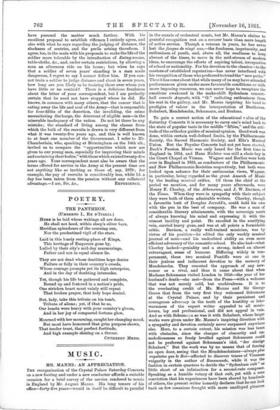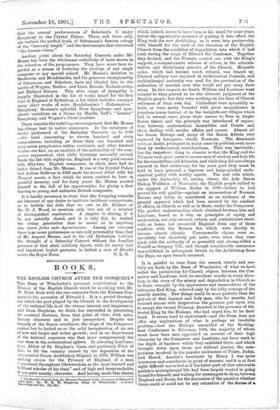MUSI C.
MR. M_A.NNS AN APPRECIATION.
THE reorganisation of the Crystal Palace Saturday Concerts on a new footing and under a new conductor affords a suitable occasion for a brief survey of the service rendered to music in England by Mr. August Maims. His long tenure of his office—forty-five years—would in itself be difficult to parallel
in the annals of orchestral music, but Mr. Manna's claims to grateful recognition rest on a securer basis than mere length of active service. Though a veteran in years, he has never lost the fougue de vingt ans,—the freshness, impetuosity, and enthusiasm of youth, and, above all, the readiness to keep abreast of the times, to move in the mid-stream of modern ideas, to encourage the efforts of aspiring talent, irrespective of school or nationality. For his devotion to the classics—to the masters of established reputation—has never interfered with his recognition of those who preferred to tread the " new paths." Thus it h as come about that while many of us may have attended performances given under more favourable conditions or with more imposing resources, we can never hope to recapture the emotions awakened in the make-shift Sydenham concert- hall consuls Augusto, with " G." radiating enthusiasm from his seat in the gallery, and Mr. Manus inspiring his band to prodigies of valour in the interpretation of Beethoven. Schubert, Mendelssohn, Schumann, and Brahms.
To gain a correct notion of the educational v alue of the Saturday Concerts it is necessary to carry one's mind back to the state of popular taste in the middle "fifties," and the atti- tude of the orthodox guides of musical opinion. Good work was done, within certain well-defined limits, by the Philharmonic Society, the Sacred Harmonic Society, and Ella's Musical Union. But the Popular Concerts had not yet been started, Bach's Passion Music was only heard for the first time in England in 1854, and Hans Richter was still a choir-boy in the Court Chapel at Vienna. Wagner and Berlioz were both over in England in 1855, as conductors of the Philharmonic and New Philharmonic Societies respectively, but both were looked upon askance for their antinomian views, Wagner, in particular, being regarded as the great Anarch of Music by the leading musical critics. Of these the chief at the period we mention, and for many years afterwards, were Henry F. Chorley, of the Athena-um, and J. W. Davison, of the Times. When they were in sympathy with their subject they were both of them admirable writers. Chorley, though a favourite butt of Douglas Jerrold's, could hold his own with the pen in the best of company. He was a man of considerable literary attainments, with the sovereign merit of always knowing his mind and expressing it with the utmost lucidity and point. He excelled in the scarifying vein, carried heavy guns, and was at all points a formidable critic. Davison, a really well-trained musician, was by virtue of his position—he edited the only weekly musical journal of note—and his undoubted ability an even more efficient adversary of the romantic school. He also had—what Chorley lacked—geniality and a strong, indeed an almost extravagant, sense of humour. Differing widely in tem- perament, these two musical Pontiffs were at one in their jealous and indiscreet devotion to the memory of Mendelssohn. They resented the approach of any new- comer as a rival, and thus it came about that when Madame Schumann visited London in 1856—the year of her husband's death—she met—from the Press—with a welcome that was not merely cold, but unchivalrous. It is to the everlasting credit of Mr. Manna and Sir George Grove that from the very first they welcomed Schumann at the Crystal Palace, and by their persistent and courageous advocacy in the teeth of the hostility or luke- warmness of the expert writer appealed to all music- lovers, lay and professional, and did not appeal in ram. And as with Schumann so was it with Schubert, whose larger works were given under Mr. Manna's inspiring direction with a sympathy and devotion certainly never surpassed anywhere else. Here, to a certain extent, his mission was less beset with obstacles, since the charger; of obscurity and un- melodiousness so freely levelled against Schumann could not be preferred against Schumann's idol, " der enazige Schubert." But the work was by no means that of forcing an open door, seeing that the Mendelssohnians--always plus royalistes que le Roi—affected to discover traces of Viennese vulgarity in the author of Ttosamuncle, while it was the fashion in certain quarters to deride the " Sydenham cult" as little short of an infatuation for a second-rate composer. Speaking as a humble votary of that cult, yet with a sire conviction that his experiences have been shared by hundreds of others, the present writer honestly declares that he can look back on few oocasions fraught with more unalloyed pleasure
than the annual performances of Schubert's C major Symphony at the Crystal Palace. There, and there only, one realised the perfect truth of Schumann's famous eulogy of the "heavenly length" and the instruments that ainversed " like human voices."
Another point about the Saturday Concerts under Mr. Manus has been the wholesome catholicity of taste shown in the selection of the programmes. They have never been re- garded as a means of fostering the prestige of any single composer or any special school. Mr. Manna's devotion to Beethoven and Mendelssohn, and his generous championship of Schumann and Schubert, have not blinded him to the merits of Wagner, Berlioz, and Liszt, Dvorak, Tschaikowsky, and Richard Strauss. This wide range of sympathy is happily illustrated in the list of works heard for the first time in England at Sydenham, a list which includes, amongst many other works of note, Mendelssohn's " Reformation " Symphony, Brahms's splendid First Symphony, and sym- phonic variations on a theme by Haydn, Rail's " Lenore" Symphony, and Wagner's Faust overture.
There remains the unfailing encouragement that Mr. Manna has always lent to native composers. In the catalogue of works performed at the Saturday Concerts up to 1886 —tbe total amounting to eleven hundred and sixty compositions, including no fewer than one hundred and sixty-seven symphonies, suites, overtures, and other kindred works—we find, on an analysis of the nationality of the com- posers represented, that while Germany naturally enough beads the list with eighty-six, England is a very good second with fifty-two. English composers, in short, have had no better friend than Mr. Manna. It was at the Crystal Palace that Arthur Sullivan in 1862 made his formal (Mut with his Tempest music, a fact which he never omitted to bear in grateful memory, and for forty years Mr. Manna availed himself to the full of his opportunities for giving a first hearing to young and unknown British composers.
It is hardly necessary to state that the foregoing remarks are innocent of any desire to institute invidious comparisons, or to belittle the debt that we owe to Dr. Richter or Mr. H. J. Wood, to mention only two out of a number of distinguished conductors. A chapter is closing, if it be not actually closed, and it is only fair to remind the rising generation that in music as in anything else vizere fortes ante Agamemnona. Among our veterans there is no more picturesque or intrepid personality than that of Mr. August Manna, and to the old Sydenham habitugs the thought of a Saturday Concert without the familiar presence of that alert, soldierly figure, with its snowy hair and impatient boyish gestures, is indeed a case of Hamlet



























































 Previous page
Previous page